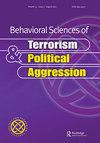恐怖分子动员的博弈论模型:镇压性和宽容性反恐以及俱乐部商品对恐怖分子决策的影响
IF 1.3
Q2 POLITICAL SCIENCE
Behavioral Sciences of Terrorism and Political Aggression
Pub Date : 2021-11-08
DOI:10.1080/19434472.2021.1996435
引用次数: 1
摘要
摘要本研究提出了一个新的理论模型来解释动员个人参与恐怖主义的决策过程。该模型考虑了一个国家保持权力的能力、一个国家的各种反恐战略以及恐怖组织提供的俱乐部商品的影响。比较统计表明,一个国家保持权力的能力和采用排他性通融的反恐政策可以阻止恐怖分子的动员,而恐怖组织提供的俱乐部商品则具有相反的效果。此外,如果直接效果小于挑衅效果,压制性反恐会适得其反。该模型通过考虑镇压政策的两面性效应和宽松反恐政策的排他性,为当前的恐怖主义理论理解提供了知识基础。本文章由计算机程序翻译,如有差异,请以英文原文为准。
A game theory model of terrorist mobilization: the effects of repressive and accommodative counterterrorism and club goods on terrorist decision making
ABSTRACT This study proposes a new theoretical model of the decision-making process that mobilizes individuals to engage in terrorism. The model accounts for the effects of a state’s ability to retain power, a state’s various counterterrorism strategies, and the club goods provided by terrorist organizations. The comparative statics demonstrate that a state’s ability to retain power and a policy of counterterrorism that employs exclusive accommodation prevents terrorist mobilization, while the club goods provided by terrorist organizations have the reverse effect. In addition, repressive counterterrorism backfires if its direct effect is less than its provocative effect. The model contributes to the current knowledge base of theoretical understanding of terrorism by considering bipartite effect of repressive policies, and exclusiveness of accommodative counterterrorism policies.
求助全文
通过发布文献求助,成功后即可免费获取论文全文。
去求助
来源期刊

Behavioral Sciences of Terrorism and Political Aggression
POLITICAL SCIENCE-
CiteScore
4.80
自引率
10.00%
发文量
27
 求助内容:
求助内容: 应助结果提醒方式:
应助结果提醒方式:


